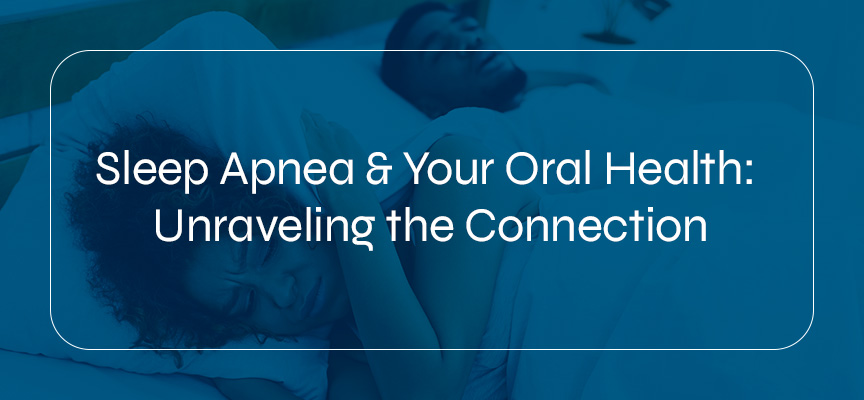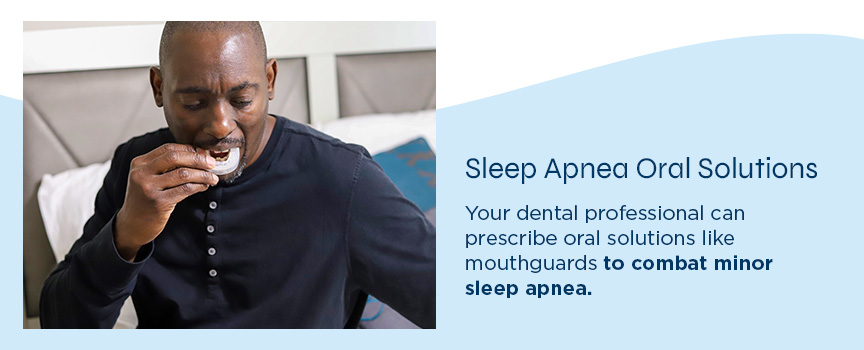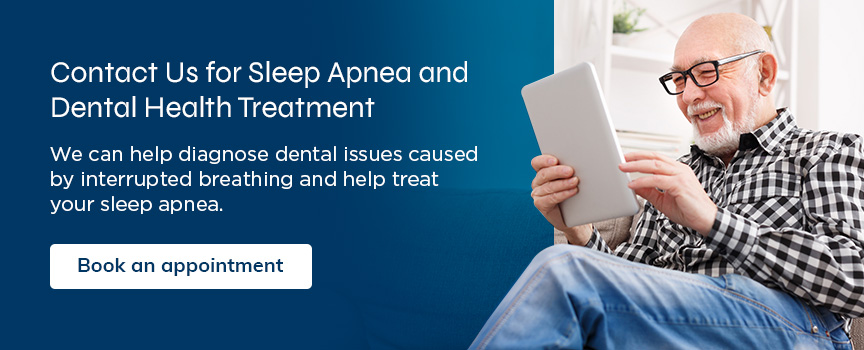
You wake up exhausted every morning, even after seven or eight hours of sleep. To add to this, you have a headache, sore throat, stiff jaw and toothache. Plus, your sleep partner complained about your snoring and teeth grinding again.
If you’ve tried everything from changing sleep positions to mediating before bed without success, you might need to visit your dentist. Yes, your dentist! Dentists are often first to diagnose sleep disorders like sleep apnea as it can cause numerous dental health issues. Moreover, treating dental problems can solve your sleep problems, morning discomfort and your partner’s poor sleep.
What Is Sleep Apnea?
Sleep Apnea is a condition caused by interrupted breathing during sleep. For example, while sleeping, your breathing stops for 10 seconds or more and continues like this throughout your rest. Your jaw or tongue often causes this interrupted breathing. While your sleep partner might notice sleep apnea symptoms, you are often unaware of your breathing interruptions. However, you might experience side effects like:
- Exhaustion
- Headaches
- Jaw tensions
- Dry mouth
- Sore throat
- Snoring
- Enlarged tonsils
The Link Between Sleep Apnea and Dental Issues
Sleep disorders and oral health go hand in hand. If you have sleep apnea, you often sleep with your mouth open, causing oral issues. One of the most common forms of sleep apnea is obstructive sleep apnea.
This sleep apnea happens when muscles in your throat or tongue relax too much, constricting your airways. This constriction can make breathing challenging, resulting in snoring and sleeping with your mouth open. Sleeping with your mouth open can cause dry mouth, sore throat, inflamed tonsillitis and periodontal issues like gingivitis.
Dental Signs of Sleep Apnea
While you might be unaware of sleep apnea or its symptoms, your dentist can identify and diagnose oral issues related to sleep apnea. Here are some dental signs of sleep apnea:
Teeth Grinding
Burixm or teeth grinding is one of the signs of sleep apnea. You might grind your teeth as a natural reaction to constricted airways and interrupted breathing. Your sleep partner might hear you grind your teeth at night, even if you are unaware. You might wake up with a sore jaw and gums. It can also cause worn teeth, receding and inflamed gums, which your dental professional can identify.
Dry Mouth
You can experience dry mouth and sore throat after sleep. Sleeping with your mouth open can cause dry mouth, bad breath, a sore throat and other infections. Your dentist can identify these symptoms. While they can be signs of conditions like the flu, they can help your dental professional identify sleep apnea.
Tooth Decay
You might sleep with your mouth open to help your breathing when you have sleep apnea. Even though you’re asleep, interrupted breathing can feel uncomfortable. Your body’s natural reaction is to find a way to alleviate this discomfort. While sleeping with your mouth might ease interrupted breathing, it can lead to oral problems like tooth decay, plaque build-up and gingivitis.
Sleeping with your mouth open prevents saliva from washing away or removing bacteria and residue from food. Many factors can cause tooth decay and gingivitis and your dental professional will consider these symptoms and other side effects when diagnosing sleep apnea.
TMJ Disorder
Temporomandibular joint (TMJ) disorder is another sign of sleep apnea. Your TMJ connects the lower jaw to the upper jaw. Like teeth grinding, you might clench your jaw as a reaction to constricted airways and sleeping with your mouth open. Clenching your jaw can cause stiff or misaligned muscles around your jaw.
While there is limited research to connect TMJ disorder with sleep apnea, many people experience symptoms like headaches, jaw pain, ear pain, neck stiffness and jaw popping or clicking when they eat. Your dental professional can identify jaw misalignment and other issues and provide treatments to alleviate sleep apnea or conditions that can cause TMJ disorder.
Sleep Apnea Oral Solutions
Treating sleep apnea and oral health can help alleviate symptoms like interrupted breathing, snoring, teeth grinding, jaw stiffness, headaches and dry mouth. Your dental professional can prescribe oral solutions like mouthguards to combat minor sleep apnea. These appliances help reposition your jaw and prevent your tongue or soft tissue in your throat from obstructing your airways.

An oral device might be suitable for minor obstructive sleep apnea and you may need more rigorous treatments for more severe forms of sleep apnea.
Scalloped Tongue
If you wake up with a sore or dented tongue, it can be a dental sign of sleep apnea. Your tongue can get in the way of your breathing during sleep. Many people may unconditionally maneuver their tongues to try to clear their airways. You might press your tongue to the bottom of the mouth to keep your airways open, creating ridges on the side of the tongue.
Inflamed Throat and Tonsils
Your throat, tonsils and mouth areas can become inflamed, red or swollen as a reaction to sleeping with your mouth open. This inflammation can persist even when you don’t have other symptoms like a cold or flu. A dentist can help identify throat and mouth inflation as part of other sleep and oral health issues.
The Role of Dentists in Sleep Apnea Treatment
Your dentist can treat sleep apnea and dental health problems. A dental professional can identify and treat dental health issues to help reduce sleep apnea. While fixing oral issues can help treat sleep apnea, you might require alternative treatment solutions.
Sleep apnea has many forms — some might be related to conditions other than dental issues and require additional treatment. For example, central, complex sleep apnea can be connected to respiratory problems, severe obstructive sleep apnea or a combination. These sleep apnea forms might require oral and respiratory solutions.
Who Can Get Sleep Apnea?
Adults and children can get sleep apnea. However, it is more common in adults over 65 and can affect more men than women. Getting professional advice is vital if you experience symptoms like headaches, jaw pain and stiffness or sleep with your mouth open and grind your teeth. You can book a consultation with your dental professional, who can examine oral or dental issues like teeth grinding.

Contact Us for Sleep Apnea and Dental Health Treatment
Treating sleep apnea and dental problems caused by it is one of the best solutions for better sleep and oral health. At Dental Choice, we understand the importance of good dental health and sleep.
We can help diagnose dental issues caused by interrupted breathing and help treat your sleep apnea. We work with you to help you understand your sleep apnea and find suitable treatments and solutions. Our dentists make a difference and can help you with better sleep and dental health.
Contact us to book an appointment today!